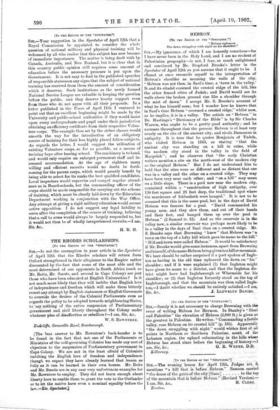HEBRON.
'To THE EDITOR OF THE "SPECTATOR."1 'Hebron upheave, •
The dawn struggling with night on bie shoulder." SIR.—My ignorance, of which I am honestly conscious—for I have never been in the Holy Land, and I am no student of Palestinian geography—is not, I fear, as much enlightened and convinced by Mr. Stopford Brooke's letter in the Spectator of April 12th as you assume that it ought to be. I cftnnot at once reconcile myself to the interpretation of Hebron's shoulder as meaning the walls of the city. " Hebron was not then, in Saul's time, a `town in the valley.' It and its citadel crowned the crested ridge of the hill, like the other fenced cities of Judah; and David would see its walls above the broken ground rise like a shoulder through the mist of dawn." I accept Mr. S. Brooke's account of what he has himself seen; but I wonder how he knows that in Saul's time Hebron " crowned a crested ridge," whilst now, as he implies, it is in a valley. The article on " Hebron " in Dr. Hastings's " Dictionary of the Bible " is by Sir Charles Warren, who ought to be a pretty good authority ; and he assumes throughout that the present Hebron is at least very nearly on the site of the ancient city, and rivals Damascus in antiquity. It is true that he quotes Benjamin of Tudela, who visited Hebron in 1163, as stating that the ancient city was standing on a hill in ruins, while the modern city stood in the valley in the field of Macpelah "; and he observes that " the early Christian writers mention a site on the north-west of the modern city as the original Hebron." But I do not understand him to hold that the sites were so different and so distant that one was in a valley and the other on a crested ridge. They may have been very near each other; and "on a hill" may mean on a little slope. There is a pool now near the modern city, contained within a " construction of high antiquity, over 130 feet square and 28 feet deep, the traditional spot where the murderers of Ishbosheth were hanged." It is not to be assumed that this is the same pool, but in the days of David Hebron was famous for a pool. "David commanded his young men, and they slew them, and cut off their hands and their feet, and hanged them up over the pool in Hebron " (2 Samuel iv. 12). And as the reservoir is in the valley now, a similar reservoir was perhaps more likely to be in a valley in the days of Saul than on a crested ridge. Mr. S. Brooke says that Browning " knew " that Hebron was "a town on the top of a lofty hill which gave its name to the hill." " Hill and town were called Hebron." It would be satisfactory if Mr. Brooke would give some instances, apart from Browning and himself, of the name Hebron being given to a hill or mountain. We here should be rather surprised if a poet spoken of Ingle- ton as having in the old time upheaved the dawn on " his" shoulder; and if it were explained (1) that Ingleton might have given its name to a district, and that the Ingleton dis- trict might have had Ingleborough or Whernside for his shoulder ; or (2) that Ingleton formerly stood on the top of Ingleborough, and that the mountain was then called Ingle- ton,—I doubt whether we should be entirely satisfied.—I am,










































 Previous page
Previous page